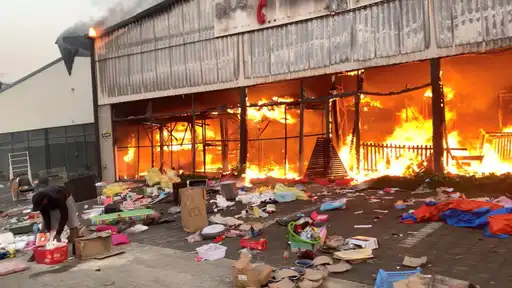Looting in South Africa

Looting refers to the act of stealing or taking goods or valuables by force or during times of chaos, often from stores, homes, or other places. It typically occurs during periods of civil unrest, natural disasters, or social upheaval when law and order are disrupted. Looting involves individuals or groups breaking into establishments, damaging property, and taking items without permission, often for personal gain or as an expression of frustration or protest.
When did looting occur in South Africa?
Looting has occurred at various times in South Africa’s history, including recent incidents in 2021 and 2022.
What triggered the recent looting in South Africa?
The recent looting in South Africa was triggered by social and economic tensions, sparked by the arrest of former President Jacob Zuma.
Where did the looting primarily take place?
The looting primarily took place in provinces such as Gauteng and KwaZulu-Natal.
What types of businesses were targeted?
Various businesses were targeted, including malls, shops, warehouses, and distribution centers.
Were there specific reasons for targeting certain businesses?
Some businesses were targeted due to perceptions of wealth, affiliation with certain groups, or the availability of valuable goods.
Did the looting lead to violence?
Yes, the looting often escalated into violence, including clashes with security forces, arson, and destruction of property.
How did the government respond to the looting?
The government deployed security forces and implemented measures to restore order and ensure public safety.
Did the looting have an impact on the economy?
Yes, the looting had a significant negative impact on the economy, leading to the loss of businesses, jobs, and damage to infrastructure.
Did the looting have any political implications?
The looting had political implications, highlighting underlying social and economic challenges and exposing divisions within society.
Were there any casualties during the looting?
Yes, there were reports of casualties, including both civilians and law enforcement officers.
Were the looters primarily individuals or organized groups?
There were both individual opportunistic looters and organized groups involved in the looting.
Was there any involvement of criminal elements?
Yes, criminal elements took advantage of the chaotic situation to engage in looting and other illegal activities.
Were there any efforts to prevent looting?
Efforts were made to prevent looting through increased security presence, curfews, and community initiatives.
Did the looting affect access to essential goods?
Yes, the looting disrupted the supply chain, leading to shortages of essential goods in some areas.
Did the looting have any long-term consequences?
Yes, the looting had long-term consequences, including economic repercussions, increased social tensions, and loss of public trust.
Did the looting impact international perceptions of South Africa?
The looting did impact international perceptions of South Africa, raising concerns about stability and the business environment.
Did the government provide assistance to affected businesses?
The government implemented programs to provide assistance and support to affected businesses.
Did community members help protect businesses from looting?
Yes, in some cases, community members formed citizen groups to protect businesses from looting.
Were there any arrests made in connection with the looting?
Yes, many arrests were made in connection with the looting, targeting those involved in criminal activities.
Did the looting affect tourism in South Africa?
The looting had a negative impact on tourism, with potential travelers expressing concerns about safety and stability.
Were any measures taken to prevent future looting?
The government implemented measures such as improving intelligence gathering, strengthening security forces, and addressing underlying socio-economic issues to prevent future looting.
The looting highlighted existing social divisions and had a negative impact on social cohesion in some areas.
Did the looting lead to any reforms or policy changes?
The looting prompted discussions on policy changes, including addressing inequality, improving governance, and enhancing social programs.
How did the international community respond to the looting?
The international community expressed concern and offered support to South Africa during the crisis.
Did the looting lead to any inter-ethnic tensions?
The looting did contribute to inter-ethnic tensions in certain areas, exacerbating existing divisions.
Were there any efforts to rebuild affected areas?
Efforts were made to rebuild affected areas, including repairing damaged infrastructure and supporting businesses in their recovery.
Did the looting impact food security?
Yes, the looting disrupted the supply and distribution of food, leading to concerns about food security in some areas.
Did the looting lead to any changes in policing strategies?
The looting prompted a review of policing strategies and the deployment of resources to prevent and respond to similar incidents.
How did the looting affect the trust between citizens and the government?
The looting eroded trust between citizens and the government due to perceived failures in addressing underlying issues and preventing the unrest.
Share This




